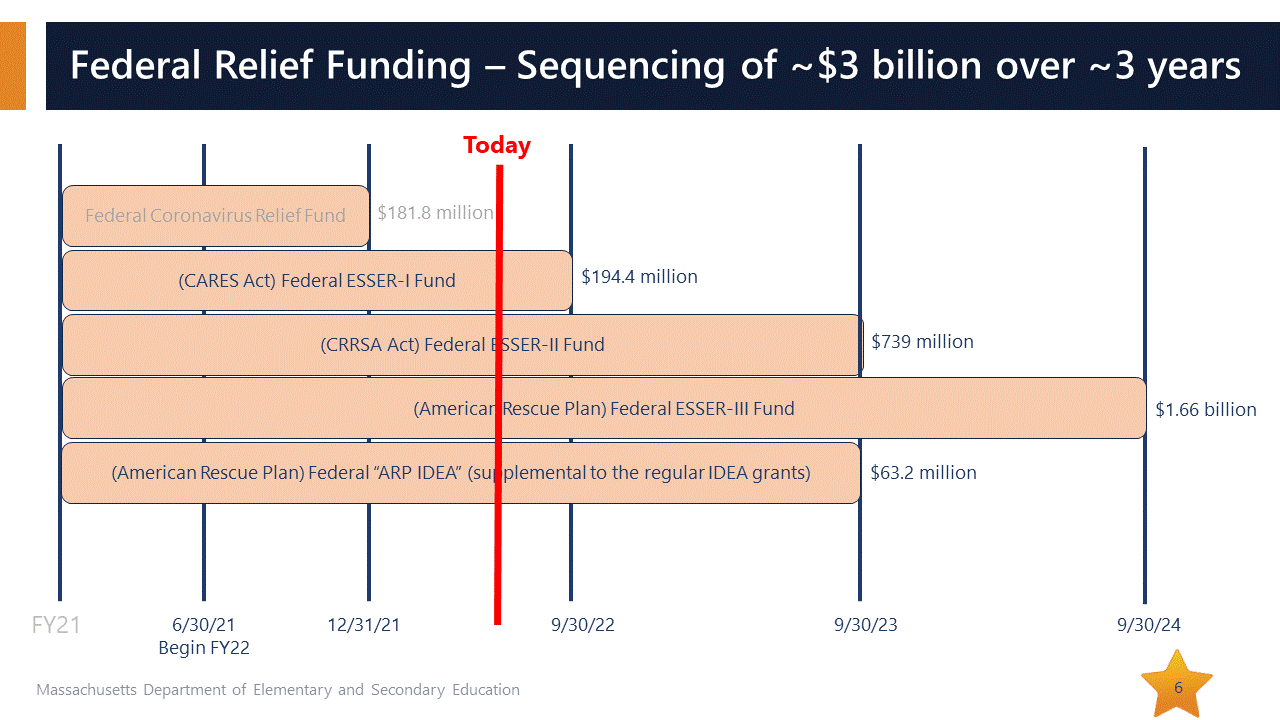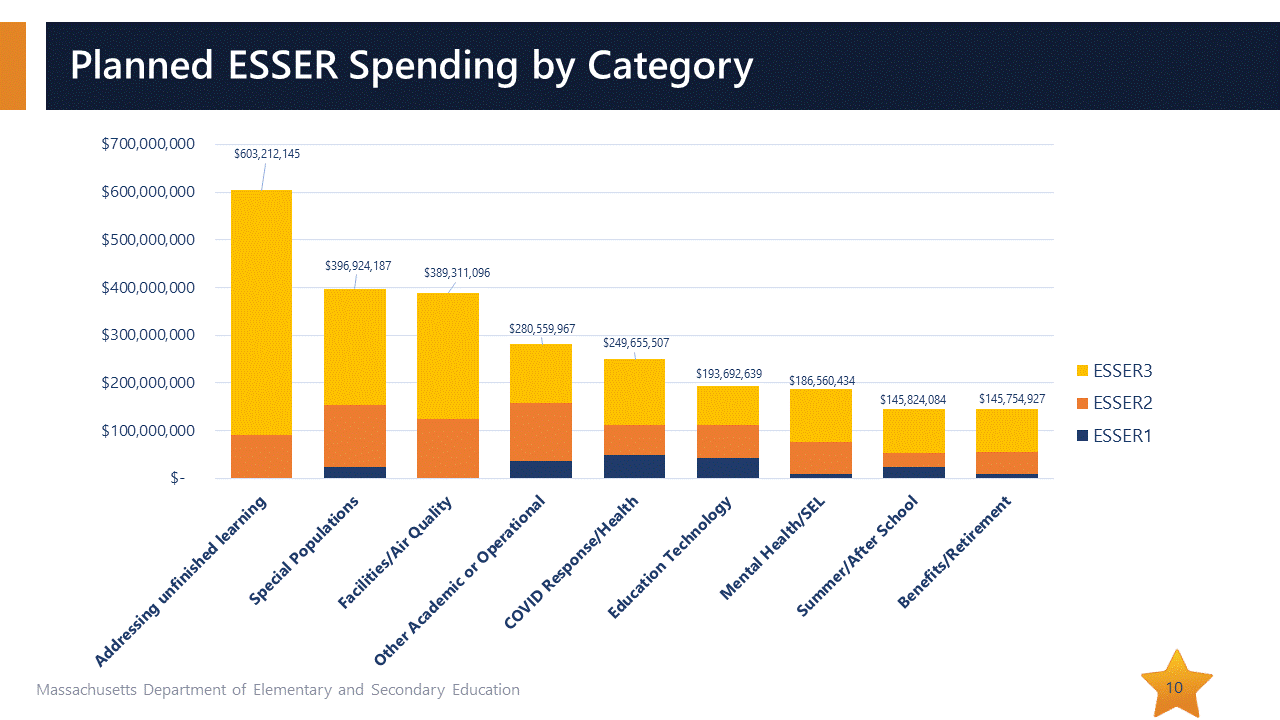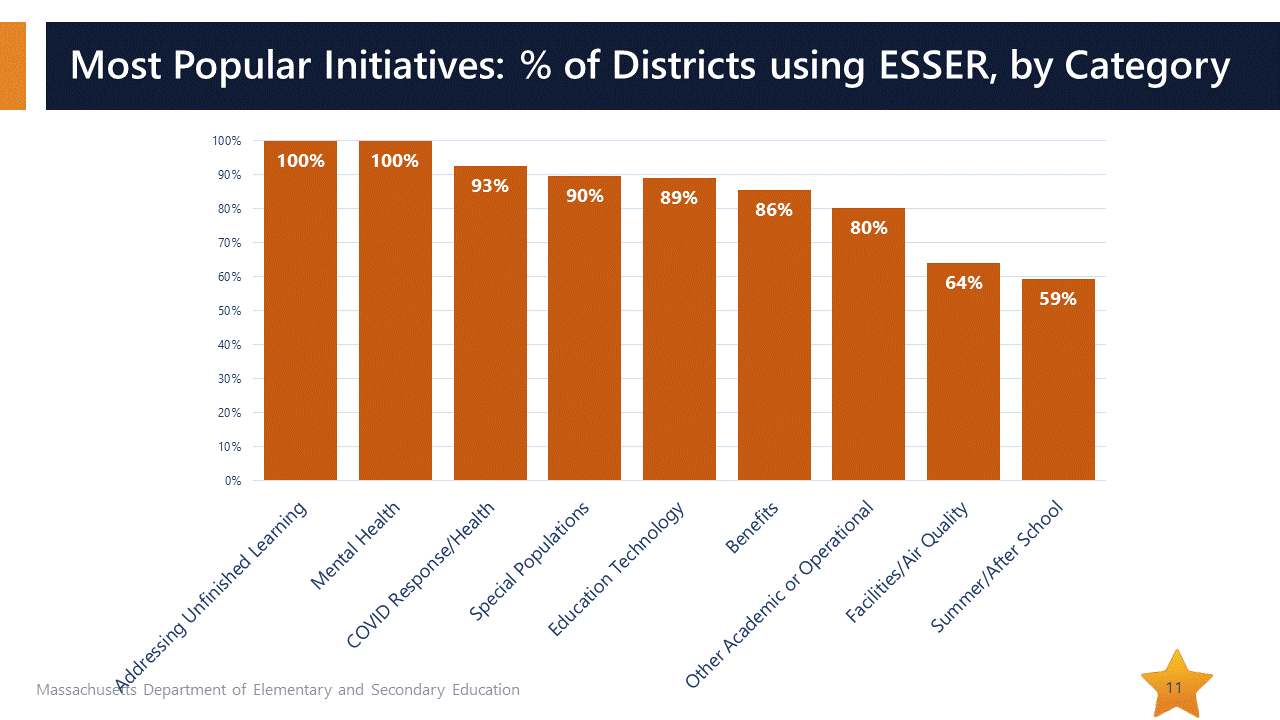
Search
June meeting of the Board of Elementary and Secondary Education
- Details
- Published on Tuesday, 28 June 2022 16:01
The Board of Elementary and Secondary Education had their regular June meeting on June 28 at 9 am. The agenda is online here; the video of the meeting is available here.
Commissioner Jeffrey Riley participated remotely, as he has COVID.
The day before the meeting of the Board, the item on Boston Public Schools, which was on posting a recommendation that the Boston Public Schools be declared on a Board vote as underperforming, was revised to be an update, as a plan agreed upon by Boston Mayor Michelle Wu and Commissioner Jeffrey Riley was released to the public.
As such, public comment on Boston focused largely on the agreement, rather than any discussion of the Boston Public Schools' status. Boston Mayor Michelle Wu, speaking alongside Boston School Committee Chair Jeri Robinson, said they were "ready and eager for the work ahead," commenting "local communities know best...and local communities are best" positioned to deliver change. She said that Boston "refused to enter anything less than a partnership because that's what ou kids deserved," adding that the district's standards were higher than those outlined in the agreement. Robinson, noting her own history in Boston, said "this is a hundred years of inequities and problems...but we honestly have to begin and we honestly have to stay laser focused" on improvements.
Boston Teachers Union President Jessica Tang, moving away from her prepared remarks, said, "I'll just say: I didn't want to be here today...We have so much work to do in our district [and]...this roller coaster ride we've been on has turned our time, energy, and resources away from that work." She said, "I'm disappointed, because these threats should have never been on the table in the first place." She said, "there's critical and important work to do, and we have solutions: you just have to ask us."
Boston Education Justice Alliance Director Ruby Reyes updated the Board on a public document request that she submitted to the Department regarding communication around receivership; she is now in week ten with no documents. Given that one of the significant concerned raised by the Department regarding the Boston Public Schools has been data use and transparency, Reyes said, "there is a layer of hypocrisy that I would like to point out" at this point. She said, "do not trust you, Commissioner Riley" and noted the lack of progress of districts under state receivership.
There was also public testimony in support of the moving forward to public comment the initial draft of regulations regarding dyslexia from Nancy Duggan of Decoding Dyslexia, and Gery Mroz on the Commissioner's evaluation, who said "the complacency of this Board is one reason this education system hasn't improved."
Regarding Boston, the Commissioner thanked the Boston School Committee, Boston Superintendent Brenda Cassellius, and "at the end of the day, it's the mayor we need to thank." He said, "they think they can do it; we want to help them do it...DESE "used to be all compliance all the time...but we also need to be a supportive organization." He thought that during COVID, those in the Department "have been pivoting."
He then asked Assistant Commissioner Russell Johnston to walk through the plan as presented. He outlined the areas as follows:
- student safety
- special education
- transportation
- facilities
- English learners
- transformation schools
- data
- accountability
The Department will provide $10M, technical assistance, and school support. Johnston said there are "very defined timelines and very clear procedures in place" for a three year plan.
Noting that the Board had had very little time with the plan and that she planned to call a July meeting, Chair Katherine Craven asked if the Board had any questions. Member Mary Ann Stewart asked if there was more to the facilities section, at which Johnston noted the city's New Green Deal for schools. Student Member Elani Carris Livingston urged "continued engagement" of the Board with the Boston Public Schools. Member Michael Moriarty said he had prepared his remarks when the Board was to vote on declaring Boston Public Schools underperforming; he expressed concern that the resolution had taken as long as it had, saying that he viewed this as adults fighting over power and money, urging the Commissioner to "drop the other shoe" [of receivership] as needed. When those in his home district of Holyoke, where he served on the Holyoke School Committee, ask what the path out of receivership is, he says, "I don't know," but says that they need to support the receiver. Member Darlene Lombos stressed the importance of organizations representing people, which is what her seat represents. She said, "receivership is not okay for Boston Public Schools, for the state, or for any district." Moriarty responded that he wasn't calling for a receivership. Member Amanda Fernández said that it is a really challenging time, and she'd like to see more creativity in addressing these issues. Vice Chair James Morton said there are a lot of questions remaining; he said, "these are our children...think that this agreement is a reflection that everybody is doing the best we can for our children."
In further opening comments, Chair Craven said she felt the Board needed further understanding of learning loss and of educator turnover across the state. For that, and for a discussion and vote on the MCAS competency determination, she plans to call a July meeting of the Board.
The Commissioner again commented about the "disconnection" of students regarding mental health and the importance of their being in school buildings. He also said that, while the Department will provide districts with self-tests over the summer, they will not provide anything for the fall and are recommending that districts limit testing in the fall to symptomatic testing only, setting aside some tests in case of a surge.
The Board next took up, and quickly passed with minimal discussion, an amendment to educator licensure, which extends flexibilities, and an amendment to accountability regulations. The latter does two things: it suspends the one year metric on schools meeting targets to reset the threshold and it implements a chronic absenteeism reset to 20% threshold. The second of these concerned Moriarty, who asked if the other standard will also be tracked. Associate Commissioner Rob Curtin said that both would be collected and published "in the spirit of providing as much information as possible."
Secretary James Peyser, unusually, made the proposals regarding the next item, sending proposed amendments on dyslexia screening out for public comment. Speaking at length about gaps in early literacy, he noted at the current practice doesn't identify students in a timely manner, which puts them at greater disadvantage in receiving the support they need. Moriarty noted further than some states have passed laws regarding this issue. Carris Livingston noted that this went beyond literacy into students receiving other support needed; she further noted the importance of students receiving reading materials in their first language, whatever that is. The draft was sent to public comment.
The Board next received an update from CFO Bill Bell and others on budget matters. Looking back (just about) at FY22, the state saw a $219.6M Ch. 70 increase, and a $28.2M circuit breaker increase, with new state funding for early college, career and technical education, adult basic education, and support for COVID recovery. While we are awaiting the final conference committee budget for FY23, we expect to see close to half a billion dollar increase in Ch. 70, and a $60+M increase in the circuit breaker, with additional resources on impacts of education due to COVID. Simone Lynch then updated on federal COVID relief, reviewing the timelines involved: 
The Department has reviewed the spending plans for districts, breaking them down into categories of planned spending. That has yieled the following information:

In looking at what percentage of districts planned what sort of spending, the Department compiled the following:

Note that the Department allocated a small amount of funding to all districts for support of mental health services and that the federal requirement is for 20% of ESSER III spending to go to combat learning loss.
Komal Bhasin then gave an overview on how Student Opportunity Act funds were spent this year, per the plan amendments that districts were required to file based around what the Department refers to ad "evidence-based program areas." Member Marty West asked about tutoring.
On ESSER spending, Member Matt Hills asked how many districts have allocated "below a reasonable total" of their spending at this point? Bell said he didn't think he had a true standard of where a district should be. Hills pursued the question, asking "if you were to pick a percent with some degree of arbitrariness, are there districts below that percent?" Bell again demurred, noting that ongoing monitoring of spending is a function of the Department, and adding he didn't think there was a concern with districts being on pace to use the funding. Lombos noted that she wants to be sure that the Department is operationalizing concern for DEI in their spending as a department.
The Board next took up the annual report of the State Student Advisory Council, which was delivered by the student member of the Board Eleni Carris Livingston, attending her final meeting. She reviewed the regional advisory councils, and then spoke of their work. There was work this year on health and wellness; on curricular reforms including financial literacy, the history frameworks, and college and career readiness; the digital divide; student government reform; climate change; and shared resources. Among the concerns of the Council is the need for greater diversity in their representation; Carris Livingston said they "have a lot of the same type of students [that] tend to come to our meetings." When asked, she also advocated for greater ongoing communication between the SAC and the Board, rather than simply a once a year report.
Finally, the Board took up the Commissioner's annual evaluation. This was done by a subcommittee of the Board, who reviewed the Commissioner's self-evaluation and interviewed others. The report notes that this was a holistic evaluation this year, due to COVID impacts. Vice Chair Morton, in presenting the report, spoke strongly of the Commissioner's insistence on the return to school buildings. He also listed initiatives the Department is involved in across the state. He said the Commissioner had high scores for accessibility and for being a good listening, that he is diligent, and that all of his work is focuesd on being student centered. He was given a 4.75 rating on a 5 point scale, and, consistent with raises the state made available in May, the Board voted a 2% raise for him, effective July 3.
The Board deferred the scheduled executive session to a later meeting, and they adjourned.
They will next meet at a to-be-scheduled time in July.

